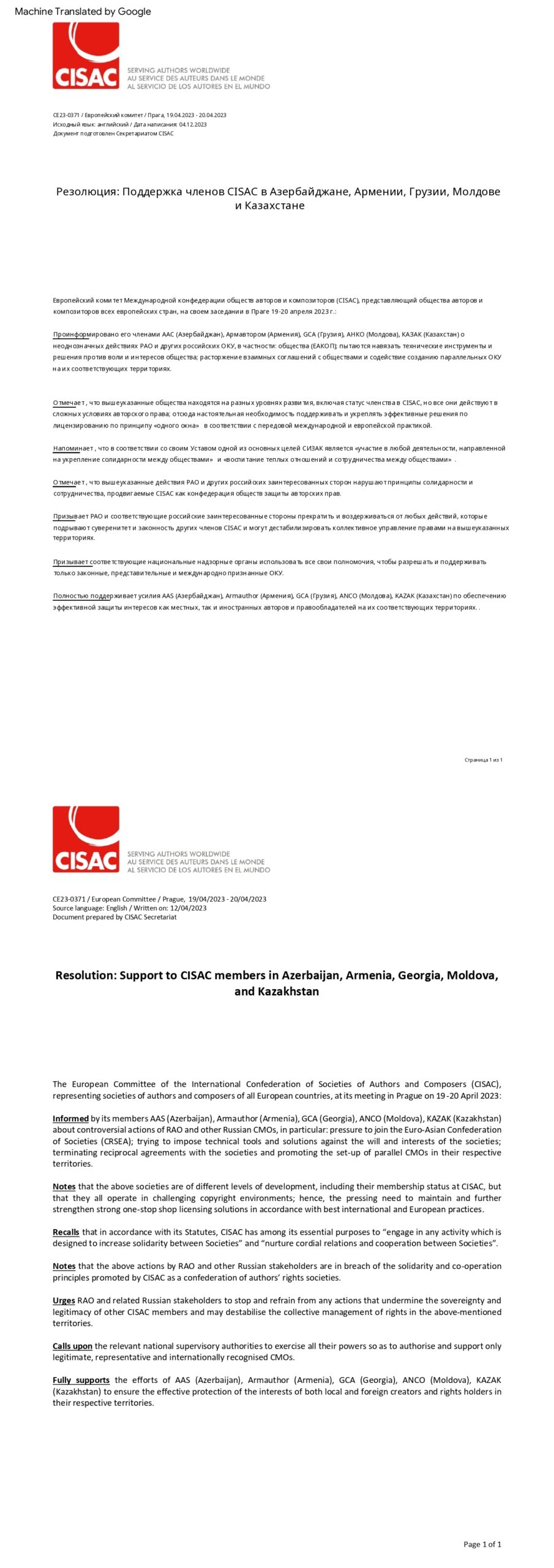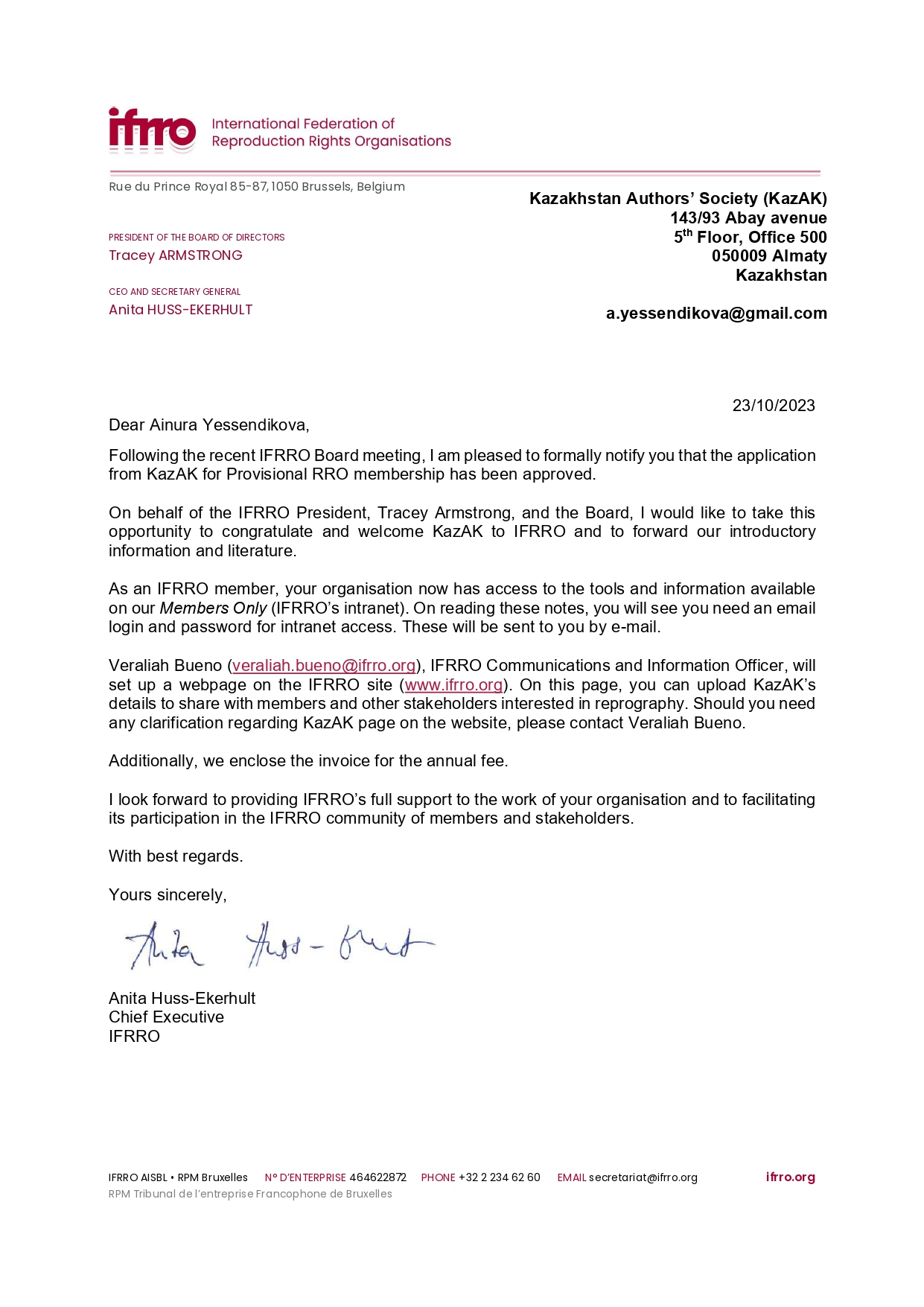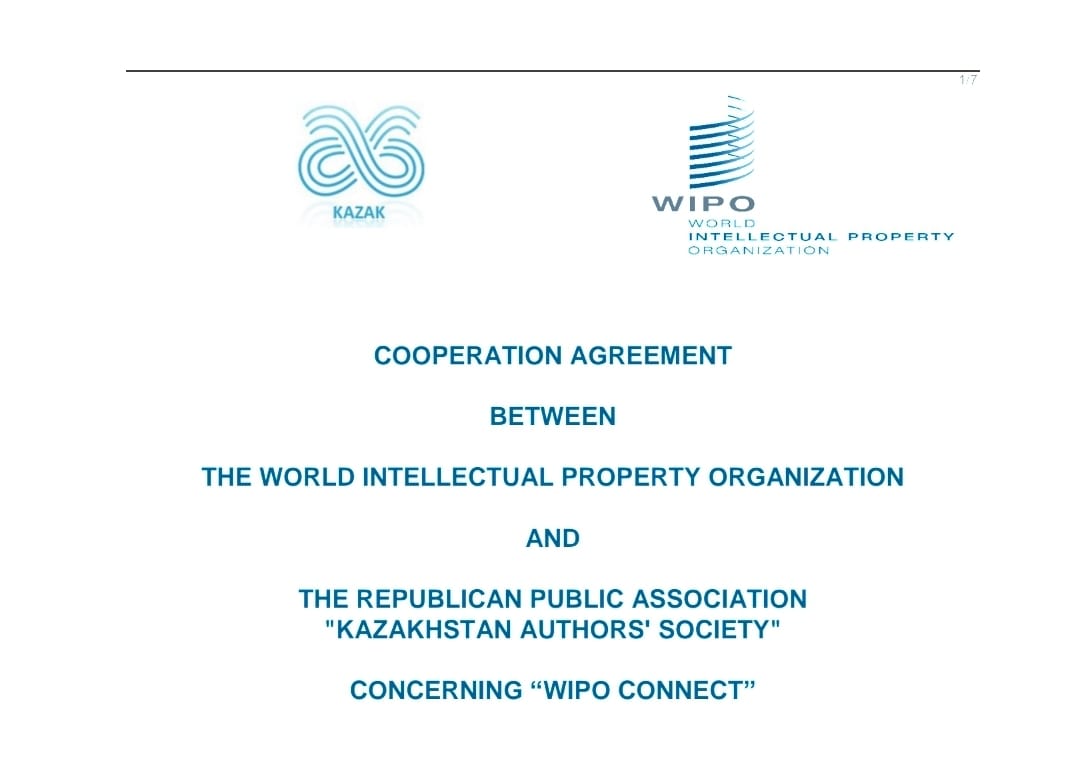Speech of KazAK’s Chairman Maral Ysskakbai at the panel conference on 7-8 July 2016г. in Astana
Dear conference participants!
I welcome you on behalf of thousands of authors represented by KazAK and thousands of users cooperating with KazAK. Today, we are celebrating 20th anniversary of the Copyright Law. I am glad to witness this date and take part in this conference. As almost all of you know, this date is especially particular for me. As fate has willed, I witnessed the development of the copyright in Kazakhstan and dedicated 25 years of my life to its establishment and promotion. I had honour to create 2 absolutely new institutions of independent Kazakhstan. In 1992, the central government body – Copyright and Neighbouring Right Agency was created under my management and, then, in 1997 I created the first collective management organization, which is still operational. I am proud that I was a head of a working group to develop the first law of Kazakhstan on copyright and neighbouring rights, which came in force in 1996. Following the decision of the interstate Assembly of MPs of the CIS, this law later became a model law for the CIS countries. Therefore, this law was in line with all the provisions of the international laws – Bern, Rome, Phonogram and Satellite conventions. Following 2 treaties of WIPO (1996г), Copyright and Performance Right Treaties, minor changes to reflect new technologies (digital, TV, internet) were made to the law.
Therefore, the ideal legal framework was created instead and chaos of 90-es was becoming just history. However, in 2009 we were seriously disappointed, the chaos is now ruling in the copyright area. The reason is the changes to the Copyright Law, namely, Article 46-1. It allows any organization, if it is accredited by the Intellectual Property Committee, to collect royalties for all authors even those who did not assigned them any rights, irrespective whether these authors domestic or foreign. This created ambiguity, since it breaches the provisions of the Civil Code, Copyright Law, Anti-Monopoly laws. As you know, the royalties collected on the basis of a particular legal fact, i.e. licensing agreement issued by CMO (collective management society). This is enshrined in Article 380.1 of the Civil Code, which refers to a regulatory act – the Copyright Law. According to Article 43.4 of the Copyright Law ‘the right-holders directly assign the collective management rights on the basis of written agreements, and respective agreements with foreign CMOs’.
Therefore, any CMO should be duly authorized by the domestic authors and foreign CMOs to sign the licensing agreements for collecting royalties. Therefore, Article 383 of the Civil Code states: «An agreement should be in line with the rules mandatory for its parties established by the laws (imperative regulations) effective at the agreement signing date». The above both provisions of Copyright Law (Articles 43 and 44) are imperative. They should not be interpreted ambiguously.
As you see, first, Article 46-1.2 ignoring the authors’ exclusive rights contradicts to 10 provisions of this law – Art. 7.2., 7.20., 16.1., 31.1., 31.2., 43.1., 43.4., 44.2. 45, etc. – the Civil Code and Competition Law (Art. 10.4.1. and 10.4.5.) as of 25.12.2008. Secondly, Article 46-1 does not stipulate the right to issue the licensing but only the right to collect the royalties. Therefore, it implies the respective powers. Due to legal illiteracy of users, any accredited dwarf CMOs started to issue the dumping rate licenses and collect the royalties, without permission of authors, in violation of the imperative provisions of the laws and hampering by the dumping rates the financial interests of the domestic and foreign authors. This is a multiple violation of the law, and only not familiar with the law persons cannot see it.
In 2009, the authors of changes to the Copyright Law followed the lead of the Russian law. However, they did not understand the gist of the Russian changes. If they wanted for example to promote competition among CMOs, they should have stipulated, along with the right to collect the royalties, also the right to issue the licenses and abolish the above imperative Articles 2, 16, 43 and 44 of the Copyright Law. They had not done it. Moreover, this is impossible because in this case the concept of “the authors’ exclusive rights” enshrined in all the above Articles of the Copyright Law and Civil Code would be meaningless. Thus, the contradictory provisions were made to the laws.
This is due to the ignorance then of the officers of the Intellectual Property Committee (IPC) of the international practice and the Russian situation. They recklessly borrowed the foreign regulation and submitted this law for the adoption by the Parliament. The Russians were forced to introduce this provision in 2006 to stop the chaotic growth of the dwarf societies which started to collect royalties and issue blanket licenses not having necessary powers from authors. This situation is now in place in Kazakhstan. Due to this regulation, the Russians accredited only one society for each category of rights this helped to establish the necessary order.
At present, we have 9 CMOs collecting royalties for public performances and 4 of them previously were engaged only in neighbouring rights. Some of them obtained accreditation for 6 categories of rights.
The Ministry, as a concerned body, should have understood the essence of the copyright and covered all the vacant niches over the last 20 years, such as audio-visual works, artists’ rights (resale royalty right), private recording, etc. However, they issue the accreditation only for public performance. Why? Because KazAK has made all the preparatory work in this area (KazAK developed and published 20 regulatory acts). Everybody has them now. Nobody wants to develop other areas because they do not have any idea about them. For example, we submitted to the IPC the proposals for the Government concerning both audio-visual works and private recording. We thought if they would be accepted we could start our activities in these areas. However, both proposals were ignored. Moreover, in 2014, China organized the audio-visual work conference – Beijing Round. The officers of our Ministry took part in this conference. However, nothing has been done.
Article 46-1 of the Copyright Law has the following negative implications:
- As I mentioned before, at present, we have 9 CMOs collecting the royalties both on behalf of the Kazakh and foreign authors without having any authorization from right-holders.
- These CMOs have extremely limited local authors’ membership, SAP has only 11 members (authors), KUOPIS and NSP has no any authors, at least, they did not place on their website any list of authors or repertoire, although according to the law they should be placed even before accreditation.
- The collected royalties are not paid to authors. For example, SAP has never over the last 5-6 years paid the royalties to the members of KazAK. According to the General Prosecutor’s Office, in 2011, SAP spent 95% of the collected royalties for its own private purposes. During the first 3 years, Abyroi paid to the members of KazAK only 88 mln. KZT, and, according to our calculations this amount should be about 300 mln. KZT. We sent an official letter about it. However, we have not received any explanations.
- To deprive us our users, they apply the dumping rates – ten/twelve times lower than our rates, this is even lower than the mandatory minimal rates established by the Government of Kazakhstan. This is a breach of the laws.
I want to give you some examples (dumping rates):
In 2007-2009, a cable operator paid us monthly –13 000 000 KZT. It entered into an agreement with Abyroi on 1 January 2011 and its rate now is 3 million.
In Ust-Kamenogorsk, the Pizza Blues (network of restaurants), which previously paid 262 894 Tenge monthly, they refused to pay since KUOPIS offered them the rate – 70 000 Tenge which is 4 times lower than our rates.
Theme Retail.KZ (network of trade centres) which paid monthly 471 071 Tenge, also terminated the agreement due to the dumping rates (eight times lower than our rates) covering copyright and neighbouring rights.
As I already mentioned, KUOPIS has no any author or agreement with CMOs. This is also true for NSP.
The Union of Songwriters (SAP) makes agreements with public establishments offering the rates ten times lower than the KazAK’s rates. We informed about it IPC and provided the copies of their agreements with users. Moreover, they collect the royalties not on behalf of their authors not on behalf of its 11 members, but on behalf of 3000 authors of KazAK and 4 million foreign authors whose interests are represented in Kazakhstan by KazAK.
- This causes the natural resentment of the majority of KazAK’s members and foreign CMOs. This resulted in litigations with other CMOs. Thus, KazAK had 4 legal proceedings against SAP and won 25 million Tenge. Two legal proceedings started against Abyroi on behalf of 205 KazAK’s members, they were won in all judicial instances. By and large, over the last 5 years, 235 legal proceedings have been won – the compensation amount is about 398 865 257 Tenge.
- As you see, these are millions Tenge which not paid to the lawful right-holders. This is detrimental to the property interests of authors. The state officials are made accountable for the briberies of couple hundred dollars, but for embezzlement of the budget funds nobody is even detained. Do you think that the royalties are abandoned assets? Why is their embezzlement permitted?!
Naturally, KazAK, respecting its respective mission for protection the property rights of domestic and foreign authors applied to the respective governmental and law-enforcement bodies (Ministry of Justice, Intellectual Property Right Committee, General Prosecutor’s Office, Government and Parliament), we published an open letter in 3 central newspapers on the name of the President of Kazakhstan, which was signed by 20 prominent persons.
This situation is also known to our foreign partners and CISAC, some of them wrote the alarming letters to the Government and Parliament.
We raised this issue even in 2011, when the amendments to the Copyright Law were planned to be introduced. Then, we worked with the Majilis, whose working group was headed by Z. Balieva, and the concerned body, we provided them with actual facts and necessary materials. As the result, the Majilis of the Parliament fully supported and accepted our proposal, and made the decision to abolish Article 46-1. This information was officially published in all the newspapers and internet. However, after passing to the Senate of the Parliament the adopted amendments, the Majilis on the next day declared its dissolution and nobody in the Senate could defend the proposed amendments.
One may think that we are against accreditation of other organizations to make our life easier. In fact, we are only against collection of the royalties without any authorization from both local and foreign authors at the dumping rates (which are ten times lower than ours). We are against pigging-back on literature and art of the persons who have no any relevance to creators. We demand to respect the legislation. At least, to obtain the collected royalties and pay them to their lawful right-holders. We developed a memorandum and proposed to sign it to other societies. However, they refused to sign it claiming that it includes the CISAC’s rigorous requirements and they are not acceptable for them since they are not members of CISAC. If they had signed and started to pay out the collected royalties, we could have remedied the above breach to some extent. Another issue: how they are going to distribute the royalties particularly to foreign authors, they do not know the shares of any particular author. Sometimes, even one particular work may have dozens of right-holders with various shares. Moreover, how they are going to pay out the royalties to the authors not having any data-bases, addresses or repertoire specifying the right-holders and agreements with foreign societies and domestic authors.
There are many other problems and, at present, nobody has proposed any solutions to them. In reply to our inquiries the concerned body remits us to the Prosecutor’s Office and they, in their turn, remit us to the concerned body and judicial bodies. The only body which does not remit but examines our claims is the court. As I mentioned before, over the last 5 years we have won 235 legal cases for the amount 400 million Tenge. However, if you take into account that some cases are heard in appellate instances and by the Supreme Court, you can imagine our position
Today we celebrate the 20th anniversary of the Law adoption as a great event. However, I believe, this is more like feast in time of plague.
Thank you for your attention.










